As the Founder of Copy Hackers and Airstory, Joanna gets real about her biggest struggles as a leader.
Joanna Wiebe is the founder of Copy Hackers – an acclaimed site + service that helps businesses write better. She also most recently co-founded
Claire Lew: Hi everyone. I’m Claire Lew and I’m the CEO of Know Your Company. I’m thrilled today to have with me Joanna Wiebe, who is the founder of CopyHackers, which if you haven’t already heard of, it is this amazing resource where they have online classes and tools. They also do consulting for if you want to improve your business and need to find a way to write better — which all of us do. She is your go-to person and her company is incredible.
They also actually recently launched a product called Airstory that I just learned, which is collaboration software for writers who are on a team. I’m just really excited to have Joanna here.
We first met, I want to say a couple years ago. We both spoke at the same conference at Business of Software and was blown away by her talk, her insights, and was just wanting to talk to you more. Thanks for being here Joanna.
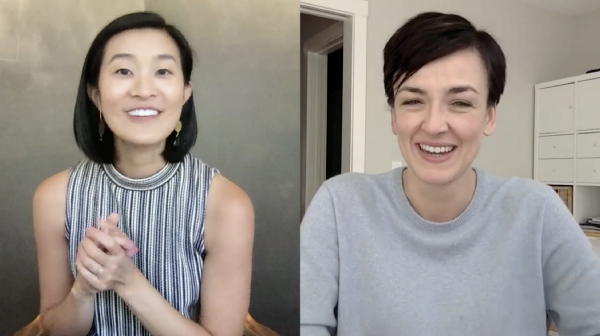
Joanna Wiebe: Thank you for having me. That was like, three years ago.
Claire: It was a while.
Joanna: I think you had just started your company.
Claire: Yes!
Joanna: Yeah, yeah.
Claire: Yeah. It was super fresh for me. Speaking at Business of Software was one of the conferences I think I spoke at that year because it was the first year of running Know Your Company. It’s been a journey.
Joanna: It’s so cool to see what you’ve done.
Claire: Oh, thank you.
Joanna: Thanks for having me.
Claire: So I’ve got one question to ask you, Joanna. As you’ve built your business over the years, what’s one thing you wish you would have learned earlier as a leader? It can be more than one too. No pressure to pick one.
Joanna: I think one of the bigger things I wished I had learned, and this might be me coming at it from a woman’s perspective possibly, is that … Oh gosh, there’s a lot. The biggest thing that stands out for me, which was a major insight and changed things and it’s still something I work really hard at, is realizing that, this might sound silly, but that people need a leader.
You want to believe that everything can be, “We’ll all figure it out together as a team. It should be this really diplomatic thing.” It should be, but I have found that people need that person to look to, to act as a leader.
Again, that might seem like, “Well obviously Joanna,” but no, it’s not obvious to me. It wasn’t obvious at all that people won’t want to figure everything out on their own. That they’ll want to have strong guidance from somebody who can then help them see what to do better. Yeah, as I say, I know how obvious it is, but I think it felt aggressive or too assertive to lead, to say, “Here’s the vision that I’m setting,” and you want to get people on board with it of course.
Claire: Right.
Joanna: I found that I lean really far toward, “Are you guys okay with that? What do you guys think about that? Is that going to work for you?”
Claire: Sure. Yep.
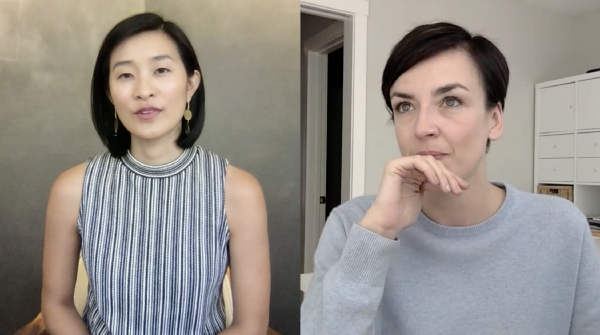
Joanna: When I just state it and we discuss, for me it has worked better than trying to be a quiet leader or the shy leader.
That’s one of the bigger revelations and it’s something that I have to keep working on, right? I knew that running a team would be hard because when I worked in-house, I never wanted to be the team leader. I ended up in the team leader role a bunch of times, but it wasn’t something that I looked for.
Claire: “The Accidental Leader.”
Joanna: Right, exactly.I’m like, “Okay. I guess I’m doing that.” Yeah. I knew that people management was hard, but leadership isn’t about people management either, which is also a weird thing for me. You don’t have to necessarily. In my experience.
You don’t need to necessarily be an outstanding “people manager” to “CEO something”, which is different from what I learned.
Claire: There are so much I want to ask about this. There are so many different parts. Talk to me about what you mean by the difference between “CEO-ing something” and being a “people manager”. What do you mean by that? What’s the difference? What are some examples maybe of things that you’ve done where you’ve been in one box and not the other?
Joanna: I’ve been called on not being a great “people manager” before.
Claire: We all have.
Joanna: It’s a weakness that I’ve identified in myself.
Claire: Okay.
Joanna: Because people are people.
Claire: Sure.
Joanna: They’re so different.
I went into leading my team thinking that the most important thing for me to do was to manage them to happiness. Okay, so great. That’s where I’m supposed to be. It’s all about just, “Are they happy? Are they satisfied?” Because we collect leadership ideas from everywhere. I collected one from, this is going to sound really dumb, from Downton Abbey.
Honestly…
Claire: That’s fine. It could have been worse. It could have been worse. No, I love your honesty Joanna.
Joanna: It’s honest, right?
Claire: Trust me, we get these ideas of leadership, you’re so right though, from shows, from family members, from things our friends say, from quotes we read in books. Nothing really that scientific sometimes.
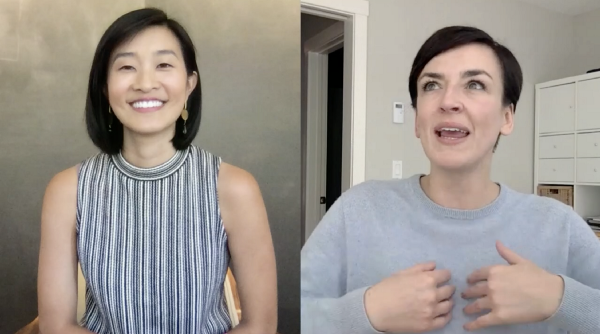
Joanna: Right. We all want to get the leadership from The Hard Thing About Hard Things. Sure, absolutely. You learn a lot of about leadership in that book, but then this is your job constantly. It never stops. Even when you’re down and watching an X-Men movie or something, you’re like, “That guy is a good leader.” You pick that stuff up.
Claire: Yes.
Joanna: For Downton Abbey, he said, the … I can’t remember his title. The main Lord guy.
Do you know?
Claire: Haha I don’t watch the show. No, no.
Joanna: Oh, you should. Anyway, he said that the reason that Downton Abbey existed, people are watching like, “Why is she talking about this?” The reason Downton Abbey existed …
Claire: No, I’m with you.
Joanna: … Was to be an employer, to make jobs. I loved that. That totally made sense to me. I’m like, “Yeah,” because I love creating jobs. I love knowing that I have a team, small nice, seven person team, but it’s still a team with families and they’re putting shoes on their kids’ feet and they’re going on vacation. I love that we can create that. I’ve loved the people side of the business so much, but I love the business side of the business too. For me, it’s been sorting out when … I know people should always – and we’re figuring it as we go — people should really always come first and if your team comes first, things work really well. Things work out.
You have to make so many hard decisions in a leadership role. Those will affect people too. I’ve struggled with the balance, if there is one, or the ordering of leading, being the CEO, setting the vision, saying, “That’s not working. We’re going to shift that direction completely and that means that we might have to find a new job for you here, a new role for you or we might have to exit you.” Having to do that, which doesn’t feel like my people management skills are as important as we grow, as those leaderships skills, making those harder decisions. There’s that.
I heard so many times that leaders are … It’s different. Some people say leaders are great people managers. Other say, that’s not the role of the leader at all to be a people manager and they of course reference Steve Jobs every time they say that. Like, “He didn’t. He wasn’t a good people manager.” Well, was he? He was a good team builder. Anyway, now I’m rambling, but there’s just so many ideas about, it’s not a conflict between people management and leadership, but there is a lot for me to still figure out there.
Claire: I think that conflict though that you’re talking about between genuinely wanting your employees to be happy on one end and then on the other end, and again not mutually exclusive, but wanting to do what’s in the best interest of the business sometimes though, are at odds.
Some people are going to be pissed because they’re going to lose their job because it doesn’t fit in line with the vision of the company or expenses are too high or whatever, right?
Joanna: Yep.
Claire: Sometimes, the decisions that you have to make, right? This is, I think, what makes it really tricky. Is it going to fall in line with wanting to be liked? I interviewed Des Traynor who’s the founder of Intercom.
One of the things that he talked about was a little bit about this tension of how, as a leader, we want to be liked and that desire to be liked is at direct odds with leading well. I’m curious if that’s something that you can relate to, if you can recall a specific moment where you were like, “Oh, okay.” Did someone call you out about this and they were like, “Joanna. You’re not doing .. ?” Or was it something that you discovered on your own?
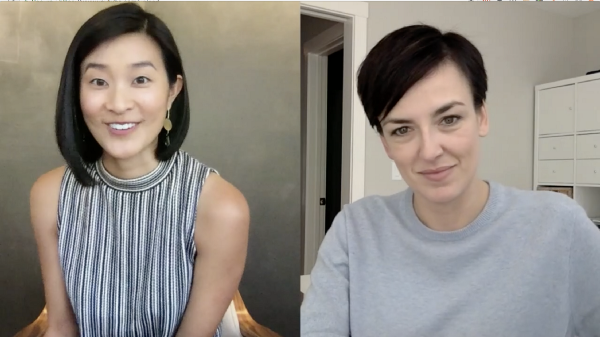
Joanna: I’ve been called out by one leader about not being a people manager. We had an argument about that, about that I didn’t believe that the role of the CEO is to first and foremost, be a people manager and I still don’t believe that.
There was that. For him, for Des to say that about likability. I think if you have a large team, and this is me not having a huge team. I don’t have 500 people sitting in an auditorium waiting for me to give a talk and they’re all my employees.
Claire: Sure.
Joanna: When you have a small team, you know everybody. You know their families. You know where they went on vacation. You saw their pictures. You guys get together for Christmas.
Claire: Right.
Joanna: Right? Small teams, there’s this, you want them to like you. I had to let somebody go who was a really good copywriter, but we’ve shifted away, with Copy Hackers, away from services towards this product that we’ve been building.
You have to be willing to commit to what you think the future is. It would be easier if I had permission to make that change — and that sounds awful. I don’t think that disqualifies me as a leader. I think it’s just like it’s something I have to overcome.
Claire: Sure.
Joanna: I have to know that it’s up to me to do hard things, which will include letting that particular copywriter go. For Des, it means not being liked because he made some hard decisions. For me, it means the exact same thing, but then having the courage to stand behind those and say, “No, I really am. I’m leading this organization. This organization needs this because I’ve created it.” It gets better because of the people in it, but I have to own that I’m going to lead this and if I want everybody to row in the same direction, I have to set that direction.
I can’t say, “What do you guys think about this direction?” They can talk with me about it and hopefully I’ll create a good environment for that, but it’s not going to be this big democracy necessarily. That’s for me, the hardest part.
I cringe at the idea of fully making decisions and cascading those out. I cringe a little bit about it. I’d rather that we could all make decisions together and everybody can do everything together. The reality is that they need a strong leader.
Claire: Right.
Joanna: They need somebody to say like, “Here’s where we’re going guys.” Then they can say, “Okay. Here’s how we rally behind that” and “Do we think we should do it that way?” We should have those discussions at that point, but I have to set that vision.
Claire: Right.
Joanna: That’s a really hard part.
Claire: Right. No, my mind is turning right now because I think what you’re also describing is just how difficult it is for leaders to make decisions and to your point of, is it a democracy? Do you take everyone’s input in when you make a really big decision like changing the direction of the company? To what extent do you ask for people’s opinion to begin with, on certain decisions? To what extent do you take those into account? What’s the metric, right?
You were saying, it would be almost nice if someone could give me permission because it’s like, there’s no ruler, so to speak, of like, “Oh. If the decision is like this, then you should ask three people, but if it’s this, then you should ask the entire company. If it’s like this, don’t ask anyone and just choose what you think.” It’s like, that would be a nice cheat sheet, but we don’t really get that.
Joanna: Do you have a cheat sheet? Haha.
Claire: No, I don’t have that! Haha. I’ll let you know when I find it. I’ll let you know when I find that because yeah, I’m still looking for it. No, but I can personally empathize in what those moments are and I’m curious for you, what is your ruler personally? What do you try to listen to or how do you try to think those moments through?
Joanna: Yeah. I know that I do well when I can discuss an idea with people that I trust. My co-founder and I, we work through ideas, but I don’t know that we have an actual ruler. I think we’re still so new with the software company. For the other side of the business, the decisions just seem to be made because it’s all mine. It’s 100% mine. I don’t ever question anything with the Copy Hackers side. I know what I’m doing. I don’t have to answer to anybody.
When we’re talking about the product side of the business, now it’s more complicated. That’s where the real leadership happens. It’s because so many things could go wrong and a lot of it feels like an experiment. It’s a huge experiment and you want to have all the smart minds you can involved in making so that the experiment goes as well as possible. A ruler, I don’t know what I would say it is. Do you have … What’s yours?
Claire: Good question.
Joanna: It’s your question. Well done.
Claire: Haha… Yeah. I don’t think this is foolproof by any means, but I do try to think and center on ultimately how do I want to help people? What’s going to be in the best interest of the organization getting in a position to do that, right?
Joanna: Yep.
Claire: We have a really particular point of view at Know Your Company for how we want to help CEO’s and employees work better together and have a more open and honest environment. We want to help as many people as we can and we want to do it in a really particular way, which is with honesty, with accountability, with transparency, and in a way that’s fun and also very straightforward. Like, simple, like no frills. Whether it’s a product decision, pricing decision, a decision around how we treat customers, hiring decisions, decisions around not raising money, right?
Joanna: Yep.
Claire: A lot of decision are all, for me personally, centered around that. I do love to talk to people as much as possible about a certain decision. On the team, I’m lucky to have Jason and David of Basecamp who are on our board as advisors. But I always know as well that, at the end of the day, I have to feel good about the decision. I’m the one that’s really going to live with it more than anyone else on the team. It’s a hard thing to say without trying to inflate the ego at all.
It’s just me thinking, “Okay. Ultimately, what can I really be doing in the best interest of the business? Given where we want to be and how we want to help people, what call do we need to make to get there?” I don’t know. It’s so hard. It doesn’t always fit so neatly.
Joanna: It’s that moment.
The moment at which you realize, even saying it, that it really does come down to you.
Claire: Yeah.
Joanna: It does. I think so, right?
Claire: It does. It does.
Joanna: That is a tense moment. You feel like, “Am I allowed to say that?”
Claire: Right.
Joanna: Because my employees and my team, they’re a huge part. I can’t do any of this without them.
Claire: Right.
Joanna: It comes down to me, but I need them, right? There’s this, “Why do I get to make the call?” Then you do get to make the call because you’re the one watching payroll.
Claire: Right.
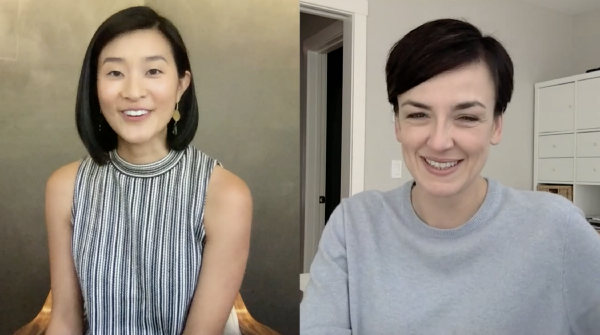
Joanna: You know how many people you can hire. It’s all on you. You’re thinking about it constantly. Maybe that’s just something that newer leaders running their own business deal with. I don’t know if the CEO of Intuit necessarily deals with the same thing.
When you’re so involved, for me at least, when I’m so involved in a small business — it’s all on my shoulders. I want to include everybody. Then there comes that moment at which, and I’ve definitely struggled with this where you just say, “No. We’re doing it this way.”
Claire: Yeah.
Joanna: I don’t think I’ve actually said, “We’re doing it this way,” but I have several times thought, “Oh. I wish I would just say, ‘We’re doing it this way,’ and just move on with it.” You need everybody to buy in and all of that stuff. It’s tense, right?
Claire: It is.
Joanna: It’s real work. The leadership side is real work.
Claire: It is. Joanna, something that you mentioned very, very early in the conversation, that you prefaced your answer with was, you said that it might be because I’m a woman that I’m feeling this way. Then you also talked a little bit about how I can’t be the shy, quiet leader.
Talk to me, to what extent do you feel like it’s maybe a personality thing? Why did you say, “Oh. It might be because I’m a woman?” Tell me about where you think maybe it might come from. That trepidation to say, “We’re going to do it my way.”
Joanna: Yeah.
Claire: It’s a hard thing for me to say too, so I can relate.
Joanna: Right? I am very conscious of how I was raised.
Claire: Yep.
Joanna: Raised to be very polite.
Claire: Yes.
Joanna: When you do something that feels impolite, which making a call often does, and it doesn’t mean it has to, but for me it does and that might be because I never really learned the skills. I didn’t grow up seeing a woman make those decisions, which I hope is not offensive to the women that raised me in any way. Wonderful people. I don’t think I saw it.
Claire: Sure.
Joanna: I know that when I was working in-house, when I was still at Intuit actually, as an example, when I was there, I got my fair share of negative feedback about being too opinionated, about making too many decisions on my own.
Claire: Fascinating.
Joanna: I didn’t think that I did. I still don’t think that I did. I think it was just uncomfortable for the people who didn’t expect me to behave that way.
Claire: Sure.
Joanna: You’re conscious of being assertive without being aggressive.
It’s easy for people to think that that assertive woman is an aggressive woman.
Claire: Yes.
Joanna: I struggle with that.
Claire: Yes.
Joanna: Am I being friendly while I’m delivering hard news?
Claire: Yes.
Joanna: Right? The things that we do. I don’t think that my leadership, I don’t want that to be my story necessarily as like, oh a “woman leader.” Not that I also don’t want that because I identify as that.
Claire: Sure.
Joanna: There’s the challenge that always comes with it, leading men and women. It’s hard to even speak about because there’s so much. It’s just the reality of, I don’t have the luxury of being raised to where everybody was saying everything you say is right.
Claire: Right.
Joanna: You should make that hard call.
I didn’t, so I’m learning that skill now that I’m older. It makes it difficult because I’m supposed to also keep using the softer people skills.
Claire: Right.
Joanna: It’s this negotiation process that is hard.
Claire: Yes. I think that is incredibly insightful Joanna and I can personally relate to so much too. I think how you’re raised and the examples and the models you have set such a big tone for how you handle conflict, for how comfortable you are making decisions.
I feel really lucky because my mom was incredibly assertive, almost sometimes too assertive when I was a kid. I would watch her in some interactions and I would cringe and go, “Oh. I feel like that might have been too much.” She might admit that herself.
I think for me, that’s probably actually influenced me in certain ways. Then to your point about environment factors and being in a situation where you might get feedback from other people about maybe being too assertive or coming off too strongly. I definitely got that when I was in college. I’ll never forget that. I was Student Body President my senior year in college.
Joanna: Wow.
Claire: I’ll never forget there were so many other executive board members or other folks who would pull me aside, all male, who would tell me, “Claire. You come off really strong in this meeting” or “I don’t know if people were receptive to this because of, I think you jumped to this too quickly” or “It feels a little aggressive the way you’re pursuing this issue.” I remember being I think, 21, 22 at the time… Being a little obviously frustrated, but that obviously shaped me too. To your point, it created a greater consciousness of what you were saying. Just the reality of, while I don’t think, “Oh, I’m a woman leader, so I need to do this,” but to acknowledge the reality that people will see something on one side and you have to acknowledge how that’s going to be received. I can completely empathize.
Joanna: Right?
Claire: It’s tough.
Joanna: There’s certain places that we’re “allowed” to lead in and other things that we all know, everybody knows, this is not a surprise, but we’re in a strange new world of leading businesses like this, so yeah, it’s just this big negotiation process. It’s a great challenge, right?
Claire: It is. Oh my gosh.
Joanna: It’s a wonderful things. I’ve loved every second of it.
Claire: It is. For all the people who gave me that feedback, to this day it’s so fascinating because interacting with both men and women, it’s so fascinating to see people know react in those ways too.
Joanna: Yes, yes.
Claire: To just treat you like a person, and believe in you as a person, and believe in your business just because they think it’s a great business and to support. I feel just lucky in my career because I know that that’s not always the experience people have, but for all the people who might have given that feedback, there are so many more who are just like, “Just do it your way, whatever that way is.”
Joanna: Yes. Completely, right? Those are the ones who I do feel that those stick out more in my head. I don’t let, I don’t find those other negative voices creeping in necessarily, but I know that they got to be in there.
Claire: Right. They exist. Yeah, of course.
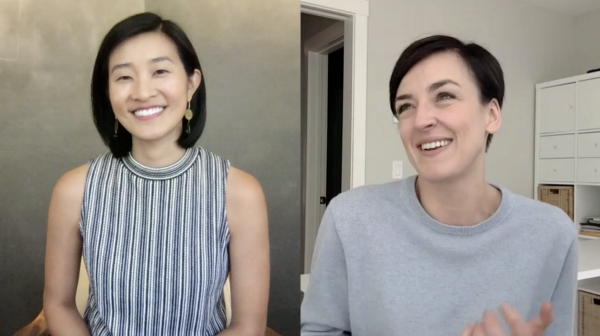
Joanna: They’re back there, but they’re not the point. It is something that when I’m talking about leading and the idea of stepping up and being the leader of a team with men on it, men who are older than I am, that’s something that Little Joanna is like, “Are we allowed to do that?” then Big Joanna is like, “Yeah. We’re allowed to do that.” It is that, right? It’s just the reality of it.
Claire: It is. It is.
Joanna: It’s how we lead. It’s part of being that leader.
Claire: It is. Well, Joanna, thank you so much for your candor and for just being very real with all of us. Honestly, it has energized me and it’s just refreshing to hear. Thanks so much.
Joanna: Well, thank you. Thanks for the fascinating question that’s going to have me thinking all day, all week I’m sure. I’ll be like, “Oh. I should have said that.”
Claire: It’s how these things go. Trust me, I know so many people will benefit from your thoughts, so thank you for sharing them.
